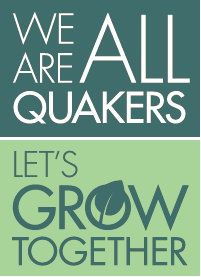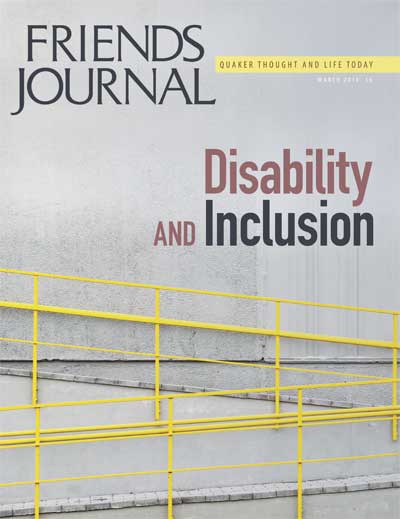
 Lucia O’Barr is currently a senior at Smith College in Northampton, Mass., where she has been studying music and medical anthropology. She spent her junior year abroad, first in South Africa studying post-apartheid political identities and how people express this through music. Then she spent time in Denmark, where she attended Quaker meeting. At Smith, she has studied prison reform and helped create a Quaker worship group on the college’s campus.
Lucia O’Barr is currently a senior at Smith College in Northampton, Mass., where she has been studying music and medical anthropology. She spent her junior year abroad, first in South Africa studying post-apartheid political identities and how people express this through music. Then she spent time in Denmark, where she attended Quaker meeting. At Smith, she has studied prison reform and helped create a Quaker worship group on the college’s campus.
How did you come to Quakerism?
Initially I came to Quakerism through my father. He has been very involved throughout his life. Until I was four years old, though, we were going to a Presbyterian church because there was no meeting around us. Then he and a few of his friends who were also interested in practicing, started Philipstown Worship Group in Garrison, N.Y., together. His starting the worship group in my hometown was when Quakerism became a more consistent presence in my life. That’s when I started getting involved in the various Quaker communities. We went to to New York Yearly Meeting (NYYM) every single summer, and I started going to Powell House Retreat Center’s youth programs.
More recently, where is Quakerism in your life?
I think it is a coming-back. I had a very consistent relationship with it most of my life. As a younger Quaker, I was very involved with my Quaker friends, and then in seventh grade, I transferred to Oakwood Friends School in Poughkeepsie, N.Y. I think that was one of the most pivotal points Quakerism has had in my life: my time at Oakwood. There was a point where we stopped going to yearly meeting, around the middle of high school for me, and that was isolating. Quakerism for me up until then was the community and wasn’t necessarily the action of practicing Quakerism, which is what it has become in my reintroduction to it. Since finding my way back to it, it has become a more conscious choice. When I was a child it was much more easy to be a passive participant. I didn’t build my own relationship to the history of Quakerism, the implications of Quakerism, and the action of Quakerism until I came back to it.
When did you start to come back to Quakerism?
I took a gap year before going to Smith. During that year, because I was traveling across the country, meeting wasn’t a part of my life. That set the tone for the distance that I felt with Quakerism. Then when I came to Smith, I tried going to the local meeting here, but I didn’t feel as comfortable. At that time I craved the camaraderie I felt with the younger Friends, and I just didn’t have that. So I stopped practicing for much of my freshman and sophomore years. During that time I was a personal care assistant for a woman at an elder care center. My job was being with her for a few hours every day, reading to her, playing music. The second semester of my sophomore year, she died. I spent a lot of time with her at the hospital. The sense of watching life leave someone and thinking about where it is going brought me back to my spiritual life. She was also deeply religious. She was a really radical Catholic nun who had done radical work. I learned a lot about her life and a lot about her spiritual practice through her family, through the books that were around us. My relationship with her brought me back to Quakerism. It provided the means for me to want to find that spiritual community again.
How did your recent year abroad influence your view of Quakerism?
A goal for my time abroad became for me to participate in any way I could in this global Quaker community. For that year abroad, I was in South Africa for seven months, and then I was in Copenhagen for five months. When I first arrived in South Africa, I lived in Durban. Durban is so noisy, and the township that I lived in was bustling all the time. We got to Sandanezwe, and we were staying with this family. Sandanezwe is this village tucked into a mountain with this gaping open landscape. We were stunned because it was completely quiet. It was just that striking juxtaposition of having our senses constantly stimulated by our environment, to having that immense space of quiet. It resonated so deeply for me with worshiping.
While I was there, I embarked on this research project called “Sound, Silence, and Movement Beating in the Foothills of South Africa.” Essentially, I lived in that village for a month and a half and studied the community’s health, what sustains the health of a community. I did all of that through looking at a community’s musical practices. I tried to understand health as a giving and receiving relationship that is beyond the medical or the psychological. A lot of my research was attending any community event that had music, and I spent a lot of time going to church. At every single church in the village, the services were almost entirely sung. It completely transformed the way that I experienced worship. The songs moved me so much. Then I read and listened to the composer John Cage. He says that there is no such thing as silence, because silence is composed of infinite sounds. I took that understanding of listening and that really transformed the way that I worship. Worshiping became so much about learning to listen, and so much about this musicality of being quiet. I don’t think I’ve ever heard myself so clearly since I began to understand that.
When I got to Copenhagen after South Africa, I found the Copenhagen Quaker meeting and started attending meeting there. The main push for that was everything that had happened in South Africa made me really crave that consistent presence of Quakerism.
What is the Quaker community at Smith like?
So, over the summer, after my year abroad, I emailed the dean of religious life and basically said, “Hi, I want to start a Quaker meeting at Smith, what do I do?” She told me that it was really easy, and gave me a list of all the students that identify as Quaker on campus. I had some meetings with the religious life staff at Smith right when I got back, who are great at organizing. In a lot of ways, starting it was maybe selfish, but it felt like this campus needed a worship group. It really needed the option of people sitting together in quiet. I just started sending out mass emails. I imagined that we would have four Quakers on the entire campus, but it was actually 20-some students that had either gone to Quaker school, had grown up Quaker, or were somehow involved.
We held our first meeting, and I think there were six or seven of us. It was so incredible. There were a lot of us who had been a part of Powell House or NYYM, so we were making all of these connections. We talked about knowing that it was something that would greatly benefit us, especially in an environment like Smith that is so high stress. Everyone was so relieved to have a space where worshiping was possible, and to have a Quaker community which had not existed in recent years. People’s schedules here are so complicated, so it’s almost impossible to find a time that works for people to come on a regular basis. But we have about five of us who are very consistent and more people that are hoping to come in the future.
What is your experience of meeting for worship?
The silence gives me space. It has made me a good listener, both in the internal sense and the external sense: quieting everything and then seeing what comes up from that place. What I love about my time in meeting for worship is that it gives me space to do the individual processing that I need to do. It gives me the space to do that, but also provides me with a sense of community, safety, and support at the same time. I think that is very unique. I see a great struggle is between individualism and interconnectivity. Whenever I’m in meeting for worship, I feel a really stunning balance between those two: between furthering my individual understanding of myself and feeling deeply connected, and furthering my understanding of interconnectedness.
What would you like to see for the future of Quakerism?
This is an interesting question. I do wonder what a more diverse Quakerism would look like. Quakers do really great work implementing Quaker values, but Quakerism is a comfortable place for predominantly white people to worship together and pursue action. It doesn’t lean enough into discomfort. In one way, it envisions really radical work—a lot of anti-racist work, a lot of anti-classist work—and that is the direct action, the politic that Quakerism pursues. But I would like to see Quakerism challenge itself more, because it’s a really beautiful way of life.



Comments on Friendsjournal.org may be used in the Forum of the print magazine and may be edited for length and clarity.